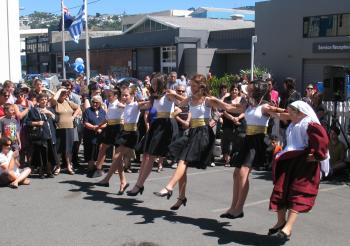The Greek Community in Wellington
According to the 2013 Census, there are 2,478 people of Greek ethnicity in New Zealand. Based in Wellington, The Greek Orthodox Community School is committed to promoting and maintaining Greek culture and language. The school provides an enriching language learning experience for their students and aims to share this with the wider community.
The Greek Orthodox Community School of Wellington
The school ensures that Greek culture and language is an everyday part of students' school experience. For example, students watch documentaries and celebrate and commemorate Greek national days and historical events. The Greek government provides a qualified teacher from Greece, who teaches alongside local Greek people at the school.
Paniyiri, celebrating all things Greek
The school has direct links with the Greek community’s main event: The Greek Orthodox Community’s Food Festival Paniyiri. Paniyiri is a celebration of Greek language and culture. It offers visitors a taste of Greece with traditional food, language and cultural entertainment. Younger members of the Greek community wear traditional costumes and perform dances from different areas of Greece. After their performance, everyone is invited to join in.
Paniyiri encapsulates the traditions of the 13 distinct associations within the Greek Orthodox Community of Wellington. In this way, Paniyiri provides people of Greek descent with an opportunity to reconnect to their Greek heritage.
Attendees are encouraged to give the Greek language a go and converse with other speakers of all ages. This is a great chance for older community members to share their language skills and stories with the younger generation. Eirini Antonogiannaki, a teacher at the Greek School, says this inspiration becomes the driving force for young people in the community to learn the Greek language.
Small beginnings
Paniyiri started as a small event in 1977 and has been taking place every February ever since. Members of the Greek community decided that sharing the food of Greece was the best way to share their traditions and culture with the wider public.
Nowadays, Paniyiri welcomes approximately 5000 people every year.
 A community effort
A community effort
Organising a festival of this size and quality is a big task. As Neove Christoforou, vice president of the Greek Orthodox community in Wellington, explains, "the Greek Food Festival would not be possible if it wasn’t for the passionate dedication of volunteers from the community."
"The value of ‘philotimo’, or giving without expecting, is embedded in the Greek culture," Ms Antonogiannaki says.
Philotimo is certainly in action when the volunteers begin preparations for the festival several months before it is held. These preparations intensify closer to the festival day. Ms Christoforou suggests that more time intensive tasks, like advertising, putting together an executive team and budgeting should be started first.
For Paniyiri, community involvement is cross-generational. Older members of the community share their expertise in the preparation of food and pass on their knowledge to the younger generation. This means everyone feels their connection within the Greek community. Chrisanthi Kamberogianni, cultural advisor to the Greek Orthodox community, was one of the youngest founders of the Greek Food Festival and still plays a driving role.
Ms Christoforou suggests communities who are organising their own festivals ask for advice from those who have organised similar celebrations in the past. The Greek Orthodox community of Wellington is happy to provide advice – feel free to get in touch with them through their website.
Take home advice
- Find out what connects you as a group and what makes you special. Research ways to promote this individuality.
- Plan all details carefully. There are more actions in the background than what is on display in a festival. Search for things that could go wrong and have a back-up plan.
- Ensure the celebration is as inclusive as possible.

